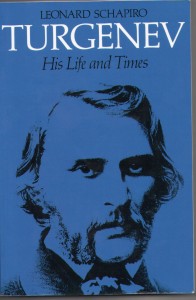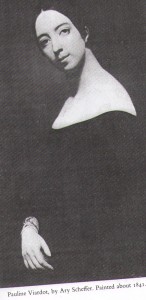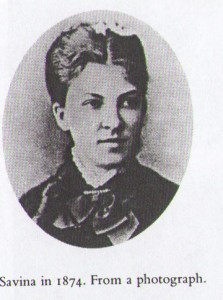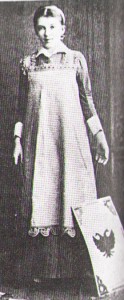 Ivan Sergeevich Turgenev (1818-1883) was born into a wealthy family, lived in the old style of a princely country house, life of magnificence. He was well educated. To the left is the book cover by Leonardo Schapiro about him.
Ivan Sergeevich Turgenev (1818-1883) was born into a wealthy family, lived in the old style of a princely country house, life of magnificence. He was well educated. To the left is the book cover by Leonardo Schapiro about him.
Turgenev in 1846 was an unusually handsome man, to judge by numerous contemporary descriptions. He was very tall and broad-shouldered. His voice was not attractive: he had a lisp, and he tended to squeak when he got excited.. But there was great gentleness and kindness in his manner of speaking, and his conversation, in spite of an occasional hesitation in choosing the right word, had a quality which enraptured his listeners.
Turgenev was one of close friends within Belinsky’s circle. Do you remember the famous article “About the Theatre'” by Belinsky?
Listen to an extract from it in Tatiana Doronina’s performance: Love the Theatre as I love it
“Theatre! Do you love Theatre as I love it? …Go to the theatre, live and die in it if you can” are such words in the article.
That is how Turgenev started moving to the theatre, understanding and loving it.
Oh, yes, about love.
Madame Viardot’s singing tours to St. Petersburg also had the effect of arousing in Turgenev a passionate, lifelong devotion to music in general, and to opera, in particular. He used to go to listen to Beethoven with Bakunin and his sister in Berlin, and while staying in Pavlovsk in the summer of 1843, he attended the evening concerts.
Pauline Viardot’s repertoire during her triumphant St.Petersburg season, which ended with a concert on 25 February 1844, would have been much to his liking-Rossini’s “Othello and Tancredi”, Bellini’s “La Sonnambula” and I Capuletti ed i Montecchi, Donizetti’s “Lucia di Lammermoor” and Mozart’s “Don Giovanni” ( the role of Zerlina).
Turgenev was friendly with the singer’s husband, Lois Viardot, as well, with whom he arranged some hunting expeditions, and once he left a note for him:” Your wife is, I will not say the greatest, she is, in my opinion, the o n l y singer in the world”.
On the morning of 1st of November Turgenev called on Pauline Viardot at the house where she was staying in St. Petersburg and… If there is such an experience as love at first sight, Turgenev became a victim of it on that morning. He immediately fell in love with her (or so it seemed) and loved her quite literally until the last conscious hour of his life, with unquestioning, submissive, undemanding devotion.
He was one of her accepted admirers, many letters were written by him to her but not many-from her to him. He could write, she could sing. Look at her portrait to the right.
Heinrich Heine, a shrewd observer, discerned a certain exotic, even barbaric quality, in the great singer:
“She is ugly but with a kind of ugliness which is noble, I should almost like to say beautiful… Indeed, the Garcia ( the maiden name of Pauline Viardot) recalls less the civilized beauty and tame gracefulness of our European home lands  than she does the terrifying magnificence of some exotic and wild country…”
than she does the terrifying magnificence of some exotic and wild country…”
But Pauline Viardot was not the only one woman in his life. Actress Maria Gavrilovna Savina was his infatuation, too, when she decided to play the part of Vera in Turgenev’s “A Month in the Country” (1850). Look at her portrait to the left and to the right her in the role of Vera.
Turgenev saw Savina frequently during his stay in 1880 in St. Petersburg: “Of all  my St. Petersburg memories”, he wrote to her from Moscow,”the most precious and the best is you. I kiss your little hands, your feet, and all that you will allow me to kiss…and even what you will not allow me. I assume that none but you will read this letter? That is why I seal it with Pushkin’s ring-the talisman”.
my St. Petersburg memories”, he wrote to her from Moscow,”the most precious and the best is you. I kiss your little hands, your feet, and all that you will allow me to kiss…and even what you will not allow me. I assume that none but you will read this letter? That is why I seal it with Pushkin’s ring-the talisman”.
Note: This ring, a gold and cornelian signet, always worn by Pushkin, was given on his deathbed to the poet Zhukovsky, and inherited by Zhukovsky’s son, who gave it to Turgenev. It passed after Turgenev’s death to Pauline, who presented it to the Museum of the Alexandrine Lycee in St. Petersburg, whence it was stolen in the course of 1917. The ring bore a Hebrew inscription.
Bless Turgenev’s noble soul multiple times for what he had achieved in his life time advancing the social and human progress in Russia, a true Lord of the Ring! One of the best Russian minds!